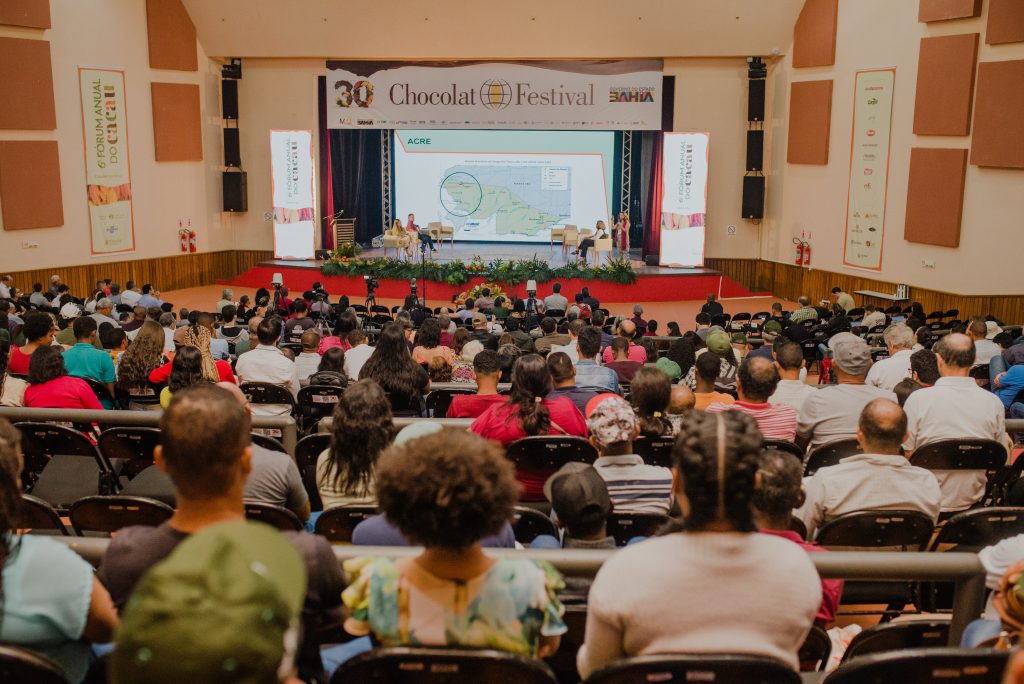CocoaAction Brasil and the World Cocoa Foundation recently held the Annual Cocoa Forum – one of the foremost events related to sustainable cocoa growing in Brazil – in Ilhéus, Bahia. Fundo Vale took part in a talk called “Social Challenges and Promoting Actions to Support the Development of Cocoa Cultivation.”

The Sixth Annual Cocoa Forum, held by CocoaAction Brasil in partnership with Sebrae and Grupo M21, in Ilhéus, Bahia, exceeded all expectations. The event, which ended on July 21, attracted a record number of participants (more than 900), including cocoa producers, technicians, organizations, manufacturers, government officials and experts, who came together to discuss global demands for sustainability, the efficient management of shaded agroforestry systems, fertilization and prevention of fungal diseases, among other initiatives to boost farmers’ productivity and profitability.
Highlights of event:
SUSTAINABILITY: Thais Ferraz of the Arapyaú Institute discussed the urgent need to fight climate change and shift to a low-carbon economy. She focused on green businesses, which have been driving biodiversity restoration projects. This is an opportunity for cocoa, which in Brazil is generally grown in agroforestry systems in the Amazon and in the Atlantic Forest in Bahia.
COOPERATIVE MOVEMENT: Renato de Melo of Coomap emphasized the importance of the cooperative movement, especially for small farmers. He stressed that cooperatives have the role of facilitating operations for their members and making them more secure and efficient. “Unity, technical assistance and professional management have put Coomap on another level. Our members’ coffee revenue increased from R$4.9 million in 2006 to R$280 million in 2022, based on the same base of members,” he said.
IMPACT INVESTING: “This type of capital is concerned about generating two things together: a financial return and social and/or environmental transformation,” explained Daniel Brandão of Vox Capital. A good example is provided by the sustainable agribusiness receivables certificates launched by Tabôa in 2020, which raised R$1 million and benefited 290 cocoa producers. “We believe that access to credit must be accompanied by technical assistance,” said Roberto Vilela of Tabôa, which will soon launch another agribusiness receivables certificate scheme, this time worth R$7 million.
TECHNICAL ASSISTANCE: This is a key factor for the chain’s development. In this context, Cacau Mais stands out. This program, run by Ciapra, a consortium spanning 14 municipalities in southern Bahia, now serves 2,400 family farmers. The goal is to raise coffee production from 14 arrobas para 80 arrobas per hectare in the space of three years. (One arroba is equivalent to 25 pounds or 12 kg.)
SUCCESS STORY: The presentation by producer Rosana Leite and her husband Gilson was the high point of the forum’s second day. “Cacau Mais was a watershed moment in our lives,” said Rosana, who grows cocoa on three hectares. According to her, the program, as well as analyzing the soil and then supplying lime and gypsum, teaches farmers how to grow cocoa optimally. This transformed the family’s farm and caused their output to soar from 35 to 100 arrobas per hectare in 2022.
FROSTY POD ROT: Brazil was the last cocoa-producing country to record this disease. Finally, the fungus was identified in Acre in 2021. “It is hard to eliminate this disease, which can destroy between 20% and 90% of output, but it can be prevented and controlled,” the speakers explained. Among other preventive tips, they recommend that farmers manage the environment to reduce humidity, quickly dispose of contaminated fruits and apply urea.
The sixth edition of the Annual Cocoa Forum occurred on July 20 and 21, as part of Chocolat Festival Bahia. The forum is an event held every year by CocoaAction to bring together the chain’s stakeholders, share knowledge, promote dialogue and facilitate networking.
Source: CocoaAction Brasil’s Press Office
